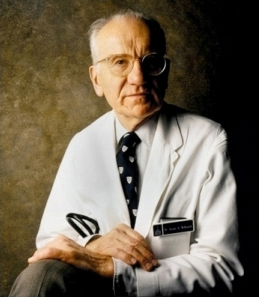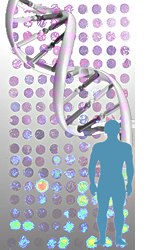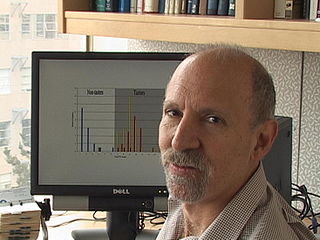Related Research Articles

Ehlers–Danlos syndromes (EDS) are a group of 13 genetic connective-tissue disorders. Symptoms often include loose joints, joint pain, stretchy velvety skin, and abnormal scar formation. These may be noticed at birth or in early childhood. Complications may include aortic dissection, joint dislocations, scoliosis, chronic pain, or early osteoarthritis. The current classification was last updated in 2017, when a number of rarer forms of EDS were added.
Online Mendelian Inheritance in Man (OMIM) is a continuously updated catalog of human genes and genetic disorders and traits, with a particular focus on the gene-phenotype relationship. As of 28 June 2019, approximately 9,000 of the over 25,000 entries in OMIM represented phenotypes; the rest represented genes, many of which were related to known phenotypes.

Victor Almon McKusick was an American internist and medical geneticist, and Professor of Medicine at the Johns Hopkins Hospital, Baltimore. He was a proponent of the mapping of the human genome due to its use for studying congenital diseases. He is well known for his studies of the Amish. He was the original author and, until his death, remained chief editor of Mendelian Inheritance in Man (MIM) and its online counterpart Online Mendelian Inheritance in Man (OMIM). He is widely known as the "father of medical genetics".

Human genetics is the study of inheritance as it occurs in human beings. Human genetics encompasses a variety of overlapping fields including: classical genetics, cytogenetics, molecular genetics, biochemical genetics, genomics, population genetics, developmental genetics, clinical genetics, and genetic counseling.

Peter H. Beighton was a British-born South African medical geneticist. He is known for inventing the Beighton Scale for joint hypermobility.

Achondrogenesis type 1B is a severe autosomal recessive skeletal disorder, invariably fatal in the perinatal period. It is distinguished by its elongated, spherical midsection, small chest, and exceedingly short limbs. The feet can turn inward and upward (clubfeet), and the fingers and toes are little. Babies affected often have a soft out-pouching at the groin or around the belly button.

Stanley Michael Gartler is an American cell and molecular biologist and human geneticist. He was the first scientist to offer conclusive evidence for the clonality of human cancers. He showed that HeLa cells had contaminated many cell lines thought to be unique. Stanley Gartler is currently Professor Emeritus of Medicine and Genome Sciences at the University of Washington.

Neil Risch is an American human geneticist and professor at the University of California, San Francisco (UCSF). Risch is the Lamond Family Foundation Distinguished Professor in Human Genetics, Founding Director of the Institute for Human Genetics, and Professor of Epidemiology and Biostatistics at UCSF. He specializes in statistical genetics, genetic epidemiology and population genetics.

Mary-Claire King is an American geneticist. She was the first to show that breast cancer can be inherited due to mutations in the gene she called BRCA1. She studies human genetics and is particularly interested in genetic heterogeneity and complex traits. She studies the interaction of genetics and environmental influences and their effects on human conditions such as breast and ovarian cancer, inherited deafness, schizophrenia, HIV, systemic lupus erythematosus and rheumatoid arthritis. She has been the American Cancer Society Professor of the Department of Genome Sciences and of Medical Genetics in the Department of Medicine at the University of Washington since 1995.

Dame Kay Elizabeth Davies is a British geneticist. She is Dr Lee's Professor of Anatomy at the University of Oxford and a Fellow of Hertford College, Oxford. She is director of the Medical Research Council (MRC) functional genetics unit, a governor of the Wellcome Trust, a director of the Oxford Centre for Gene Function, and a patron and Senior Member of Oxford University Scientific Society. Her research group has an international reputation for work on Duchenne muscular dystrophy (DMD). In the 1980s, she developed a test which allowed for the screening of foetuses whose mothers have a high risk of carrying DMD.
Robert James Gorlin was an American oral pathologist, human geneticist and academic at the University of Minnesota School of Dentistry.

Arterial tortuosity syndrome is an extremely rare congenital connective tissue condition disorder characterized by tortuosity, elongation, stenosis, or aneurysms in major and medium-size arteries including the aorta.
George M. Martin was an American biogerontologist. He was a faculty member at the University of Washington from 1957 until the end of his career. Martin was a professor emeritus in the Department of Pathology, adjunct professor of genome sciences, and director emeritus of the University of Washington's Alzheimer's Disease Research Center.

Huda Yahya Zoghbi, born Huda El-Hibri, is a Lebanese-born American geneticist, and a professor at the Departments of Molecular and Human Genetics, Neuroscience and Neurology at the Baylor College of Medicine. She is the director of the Jan and Dan Duncan Neurological Research Institute. She became the editor of the Annual Review of Neuroscience as of 2018.
Harry Harris FRS, FCRP was a British-born biochemist. His work showed that human genetic variation was not rare and disease-causing but instead was common and usually harmless. He was the first to demonstrate, with biochemical tests, that with the exception of identical twins we are all different at the genetic level. This work paved the way for many well-known genetic concepts and procedures such as DNA fingerprinting, the prenatal diagnosis of disorders using genetic markers, the extensive heterogeneity of inherited diseases, and the mapping of human genes to chromosomes

John M. Opitz was a German-American medical geneticist and professor at the University of Utah School of Medicine. He is best known for rediscovering the concept of the developmental field in humans and for his detection and delineation of many genetic syndromes, several now known as the "Opitz syndromes" including Smith–Lemli–Opitz syndrome (SLOS), Opitz–Kaveggia syndrome (FGS1), Opitz G/BBB syndrome, Bohring–Opitz syndrome, and other autosomal and X-linked conditions. He is founder of the Wisconsin Clinical Genetics Center, the American Journal of Medical Genetics, and was a cofounder of the American College and American Board of Medical Genetics.

Marshall L. Summar is an American physician, clinical geneticist and academic specializing in the field of genetics and rare disease. He is board-certified in pediatrics, biochemical genetics and clinical genetics. He is best known for his work in caring and developing treatments for children with rare genetic diseases.
Uta Francke is a German-American physician-geneticist known for her accomplishments in mapping genes to specific chromosome locations and discovering the genes and underlying mutations responsible for Prader-Willi and Rett syndromes. Her work on detailed mapping of human chromosome laid the foundation of the Human Genome Project and discovery of many other rare genetic disorders. She is currently a professor of Genetics and Pediatrics Emerita at Stanford University. She has also served as a consultant to 23andMe Inc since 2007, and as a part-time employee from 2010-2013.
Benjamin Michael Neale is a statistical geneticist with a specialty in psychiatric genetics. He is an institute member at the Broad Institute as well as an associate professor at both Harvard Medical School and the Analytic and Translational Genetics Unit at Massachusetts General Hospital. Neale specializes in genome-wide association studies (GWAS). He was responsible for the data analysis of the first GWAS on attention-deficit/hyperactivity-disorder, and he developed new analysis software such as PLINK, which allows for whole-genome data to be analyzed for specific gene markers. Related to his work on GWAS, Neale is the lead of the ADHD psychiatric genetics and also a member of the Psychiatric GWAS Consortium analysis committee.
Elaine H. Zackai is a Professor of Pediatrics, Director of Clinical Genetics, and the Director of the Clinical Genetics Center at Children's Hospital of Philadelphia (CHOP).
References
- 1 2 3 4 5 "March of Dimes gives Peter Byers lifetime achievement award". UW News. Retrieved 2024-03-18.
- 1 2 "Peter H. Byers receives lifetime award in genetics from March of Dimes". EurekAlert!. Retrieved 2024-03-18.
- 1 2 3 4 Anderson, William (2020-07-13). "ASHG Honors Peter Byers, MD with the 2020 Victor A. McKusick Leadership Award". ASHG. Retrieved 2024-03-18.